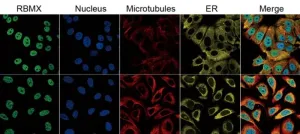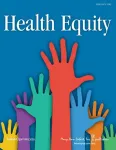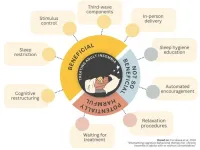(Press-News.org) EDMONTON — A University of Alberta professor is co-leading a new international vaccine safety network to examine why some people who received a COVID-19 vaccine experienced very rare adverse events associated with the vaccine.
The International Network of Special Immunization Services (INSIS), based at the U of A, is a consortium of academic medical centres around the world coming together to study very rare adverse events after vaccination. An adverse reaction is considered very rare when it affects less than .001 per cent of the population.
“The bar for safety with vaccines is very high because we’re giving them to healthy people to prevent them from getting sick,” says U of A pediatric infectious disease professor Dr. Karina Top, who alongside Dr. Robert T. Chen, scientific director of the Brighton Collaboration — a leading non-profit vaccine safety organization — is co-leading INSIS. “We don’t want these events to occur, and we want to understand why, so we can prevent them in the future.”
INSIS is receiving up to US$15.3 million over four years from the Coalition for Epidemic Preparedness Innovations (CEPI) to study why these very rare adverse events happen and who is most at risk. The network aims to help manufacturers develop new vaccines that will be even safer.
Vaccines have helped to eradicate deadly diseases such as smallpox, they save two-to-three million children a year, and they even help to combat certain types of cancer such as cervical and throat cancers, which are caused by HPV. The impact of COVID-19 vaccines has been even more striking. In the first year of their rollout during the pandemic, vaccines saved 20 million lives.
Very rare adverse events associated with immunizations tend to be detected after vaccines are rolled out at a population level. Clinical trials typically include a relatively small number of participants, which may not fully represent the diverse population that will receive a vaccine after its approval. When the vaccine is rolled out to millions of people, a broader range of individuals with varying health conditions and genetic backgrounds may receive a vaccine. This increased sample size allows for detection of very rare adverse events that might occur.
Cutting-edge safety science
The INSIS team will use cutting-edge techniques to measure the types of cells and molecules in human blood samples to identify how a vaccine may trigger an adverse event. The INSIS team will compile unprecedented amounts of data from around the world to compare information about people who experienced very rare adverse events and those who did not.
The ultimate goal of this project will be to enhance the safety assessment of vaccine candidates developed to combat emerging infectious threats before emergency authorization. This will be critical for achieving the 100 Days Mission, which aims to compress vaccine development against such pathogenic threats with pandemic potential to within just 100 days of their identification.
“Compressing vaccine development against emerging pathogens down to 100 days will be critical to combatting future pandemic threats,” explains Jakob Cramer, director of clinical development at CEPI. “Data from INSIS will help to inform health authorities on the most appropriate type of vaccine that should be used in specific outbreak settings and populations. If we can identify risk factors and identify causal mechanisms for potential serious adverse events ahead of time, immunization campaigns can be adapted to mitigate such risks in those who are potentially vulnerable to harm, contributing to increased levels of public confidence in vaccines and enabling the development of even safer vaccines.”
This global study brings together researchers from the University of Alberta, B.C. Children’s Hospital Research Institute and institutions in at least seven countries, including the Precision Vaccines Program at Boston Children’s Hospital, Mayo Clinic’s Vaccine Research Group, the Vanderbilt Vaccine Research Program at Vanderbilt University Medical Centre, Murdoch Children’s Research Institute in Australia, the Global Vaccine Data Network co-ordinated from New Zealand, Ospedale Pediatrico Bambino Gesù in Italy, Global Healthcare Consulting co-ordinated from India, and the African Leadership in Vaccinology Expertise (Wits-ALIVE).
To speak with INSIS co-lead Dr. Karina Top, please contact:
Sarah Vernon | University of Alberta communications associate | svernon@ualberta.ca
or
Debra Clark | University of Alberta communications associate | debra.clark@ualberta.ca
Other regional media contacts (please reach out directly):
USA:
Dr. Robert Chen, INSIS co-lead and Task Force for Global Health, Brighton Collaboration
Dr. Ofer Levy, Precision Vaccines Program (PVP), Boston Children’s Hospital
Dr. Gregory Poland, Mayo Clinic Vaccine Research Group
Canada:
Dr. Bruce Carleton, BC Children’s Hospital Research Institute
European Union:
Dr. Paolo Palma, Ospedale Pediatrico Bambino Gesù, Italy
Australia:
Dr. Nigel Crawford, SAEFVIC, Murdoch Children’s Research Institute
INSIS members also include:
Dr. Joann Arce, Precision Vaccines Program (PVP), Boston Children’s Hospital, USA
Dr. Al Ozonoff, Broad Institute of MIT and Harvard, USA
Dr. Buddy Creech, Vanderbilt Vaccine Research Program, USA
Dr. Sonali Kochhar, Global Healthcare Consulting, India
Dr. Steve Black, Global Vaccine Data Network, USA
Dr. Helen Petousis-Harris, Global Vaccine Data Network, University of Auckland, New Zealand
Dr. Jessica Lasky-Su, Brigham & Women’s Hospital, USA
Dr. Rae Yeung, The Hospital for Sick Children (SickKids), Canada
Dr. Ishac Nazy, McMaster University, Canada
Dr. Huyen Tran, Alfred Health, Australia
Dr. Peter Liu, University of Ottawa Heart Institute, Canada
Dr. Nicholas Wood, National Centre for Immunisation Research and Surveillance, The University of Sydney, Australia
Dr. Clare Cutland, African Leadership in Vaccinology Expertise (ALIVE), University of the Witwatersrand, South Africa
END
New U of A-based study to examine very rare adverse events linked to COVID-19 vaccines
The multimillion-dollar global initiative will study causes and risk factors, to ensure safer vaccines are ready for the next potential pandemic
2024-01-17
ELSE PRESS RELEASES FROM THIS DATE:
$24 million grant to extend Study of Healthy Aging in African Americans (STAR)
2024-01-17
Researchers at UC Davis Health and Kaiser Permanente Division of Research have received a $24 million grant from the National Institute on Aging, part of the National Institutes of Health (NIH), to continue the Study of Healthy Aging in African Americans (STAR) for an additional five years.
STAR, which launched in 2017, follows a group of approximately 750 older adults to understand how behaviors and lifestyle may increase the risk of Alzheimer’s disease and related dementias for Black and African Americans. The study ...
Metastatic breast cancer treatments have aided decline in deaths, Stanford Medicine-led study finds
2024-01-17
Deaths from breast cancer dropped 58% between 1975 and 2019 due to a combination of screening mammography and improvements in treatment, according to a new multicenter study led by Stanford Medicine clinicians and biomedical data scientists.
Nearly one-third of the decrease (29%) is due to advances in treating metastatic breast cancer —a form that has spread to other areas of in the body and is known as stage 4 breast cancer or recurrent cancer. Although these advanced cancers are not considered curable, women with metastatic disease are living longer than ever.
The analysis helps cancer researchers assess where to focus future efforts and resources.
“We’ve ...
Aberrant RBMX expression relevant for cancer prognosis and immunotherapy response
2024-01-17
“In the future, targeting of RBMX may be a novel method in cancer therapy.”
BUFFALO, NY- January 17, 2024 – A new research paper was published in Aging (listed by MEDLINE/PubMed as "Aging (Albany NY)" and "Aging-US" by Web of Science) Volume 16, Issue 1, entitled, “Aberrant RBMX expression is relevant for cancer prognosis and immunotherapy response.”
Cancer accounts for the highest rates of morbidity and mortality worldwide. RNA binding motif protein X-linked (RBMX) is a nuclear ...
Higher measurement accuracy opens new window to the quantum world
2024-01-17
A team at HZB has developed a new measurement method that, for the first time, accurately detects tiny temperature differences in the range of 100 microkelvin in the thermal Hall effect. Previously, these temperature differences could not be measured quantitatively due to thermal noise. Using the well-known terbium titanate as an example, the team demonstrated that the method delivers highly reliable results. The thermal Hall effect provides information about coherent multi-particle states in quantum materials, based on their interaction with lattice vibrations (phonons).
The laws of quantum physics apply to all materials. However, in so-called ...
National collaborative for health equity roundtable: a call for unity and the power of racial healing
2024-01-17
A new Roundtable discussion in the peer-reviewed journal Health Equity explores the results of a poll conducted by the National Collaborative for Health Equity (NCHE), called the “Heart of America Annual Survey.” The survey found that more than 80% of respondents want a national leader that unifies rather than divides us, suggesting that there is a readiness in the country to put polarization and division behind us so that we can solve our collective and common challenges and problems. Click here to read the Roundtable now.
Moderating ...
New project to improve modeling of climate change
2024-01-17
Jingrui He, professor of information sciences at the University of Illinois Urbana-Champaign, has been awarded a two-year, $600,000 grant from the IBM-Illinois Discovery Accelerator Institute to improve modeling climate change and its impact across multiple application domains. He and a team of researchers from the University of Illinois and IBM will build Climate Runtime, a computational framework integrating cutting-edge capabilities from climate foundation models and multimodal fusion. This framework will allow for accurate prediction and quantification of weather and climate events and their impact in areas such as finance ...
Climate change isn’t producing expected increase in atmospheric moisture over dry regions
2024-01-17
Contacts:
David Hosansky, UCAR and NSF NCAR Manager of Media Relations
hosansky@ucar.edu
720-470-2073
Audrey Merket, UCAR and NSF NCAR Science Writer and Public Information Officer
amerket@ucar.edu
303-497-8293
The laws of thermodynamics dictate that a warmer atmosphere can hold more water vapor, but new research has found that atmospheric moisture has not increased as expected over arid and semi-arid regions of the world as the climate has warmed.
The findings are particularly puzzling because climate models have been predicting ...
New research highlights unprecedented targeted approach to treating triple-negative breast cancer
2024-01-17
Cleveland Clinic researchers have successfully developed a therapeutic peptide that blocks aggressive cancer cells from multiplying rapidly. The results highlight a potential new strategy for developing targeted treatments for triple-negative breast cancer, which currently has no approved options.
Targeted drugs attack cancer cell functions directly, offering a more precise approach to complement broader treatments like chemotherapy. A research team led by Ofer Reizes, PhD, and Justin Lathia, PhD, designed a peptide therapeutic that disrupts the molecular processes behind aggressive cancer growth when delivered into cells.
The ...
ASBMB names Mona V. Miller as next executive officer
2024-01-17
The American Society for Biochemistry and Molecular Biology today named Mona V. Miller its next chief executive officer, effective April 1.
Miller is an experienced association leader with significant experience in strategic planning, advocacy and fundraising. Most recently, she was CEO of the American Society of Human Genetics. Before that she held multiple high-level positions at the Society for Neuroscience.
Miller said she was drawn to the ASBMB because “scientifically, biochemistry and molecular biology is at the forefront of knowledge that is transforming health and society.”
She said she looks forward to “focusing on the pivotal ...
Streamlining cognitive behavioral therapy for chronic insomnia
2024-01-17
A combination of cognitive and behavioral strategies, ideally delivered in person by a therapist, maximizes the benefits of cognitive behavioral therapy for insomnia (CBT-I), according to new research. CBT-I is a form of talk therapy, which can be delivered in person or through self-help guides. By analyzing 241 studies, involving over 30,000 adults, researchers identified the most beneficial components of CBT-I. These included: cognitive restructuring, third-wave components, sleep restriction, stimulus control and in-person delivery. Self-help with human encouragement could also be beneficial, while waiting for active treatment and enforcing ...
LAST 30 PRESS RELEASES:
The Lancet: New weight loss pill leads to greater blood sugar control and weight loss for people with diabetes than current oral GLP-1, phase 3 trial finds
Pediatric investigation study highlights two-way association between teen fitness and confidence
Researchers develop cognitive tool kit enabling early Alzheimer's detection in Mandarin Chinese
New book captures hidden toll of immigration enforcement on families
New record: Laser cuts bone deeper than before
Heart attack deaths rose between 2011 and 2022 among adults younger than age 55
Will melting glaciers slow climate change? A prevailing theory is on shaky ground
New treatment may dramatically improve survival for those with deadly brain cancer
Here we grow: chondrocytes’ behavior reveals novel targets for bone growth disorders
Leaping puddles create new rules for water physics
Scientists identify key protein that stops malaria parasite growth
Wildfire smoke linked to rise in violent assaults, new 11-year study finds
New technology could use sunlight to break down ‘forever chemicals’
Green hydrogen without forever chemicals and iridium
Billion-DKK grant for research in green transformation of the built environment
For solar power to truly provide affordable energy access, we need to deploy it better
Middle-aged men are most vulnerable to faster aging due to ‘forever chemicals’
Starving cancer: Nutrient deprivation effects on synovial sarcoma
Speaking from the heart: Study identifies key concerns of parenting with an early-onset cardiovascular condition
From the Late Bronze Age to today - Old Irish Goat carries 3,000 years of Irish history
Emerging class of antibiotics to tackle global tuberculosis crisis
Researchers create distortion-resistant energy materials to improve lithium-ion batteries
Scientists create the most detailed molecular map to date of the developing Down syndrome brain
Nutrient uptake gets to the root of roots
Aspirin not a quick fix for preventing bowel cancer
HPV vaccination provides “sustained protection” against cervical cancer
Many post-authorization studies fail to comply with public disclosure rules
GLP-1 drugs combined with healthy lifestyle habits linked with reduced cardiovascular risk among diabetes patients
Solved: New analysis of Apollo Moon samples finally settles debate about lunar magnetic field
University of Birmingham to host national computing center
[Press-News.org] New U of A-based study to examine very rare adverse events linked to COVID-19 vaccinesThe multimillion-dollar global initiative will study causes and risk factors, to ensure safer vaccines are ready for the next potential pandemic





